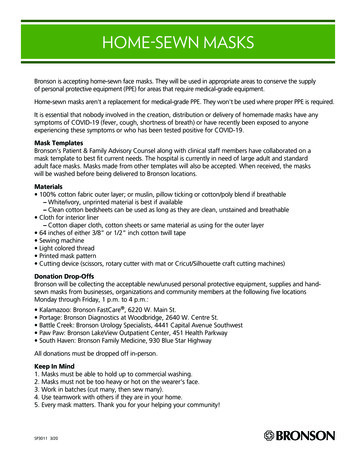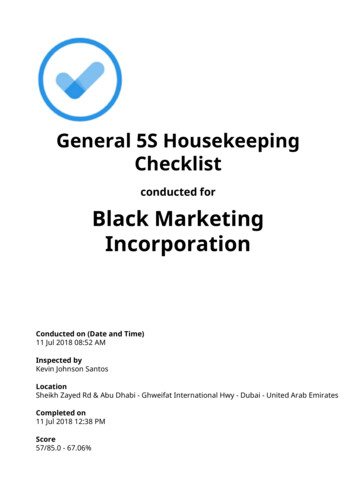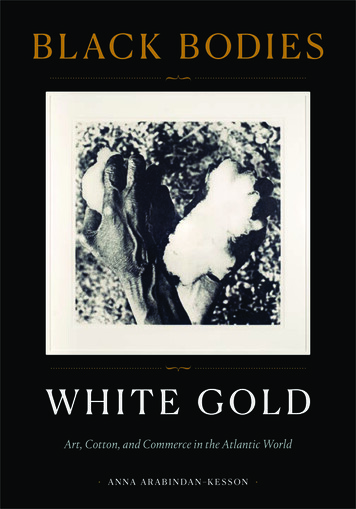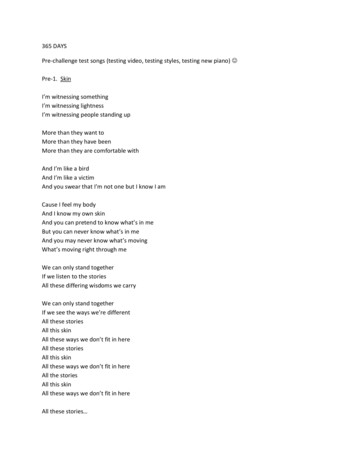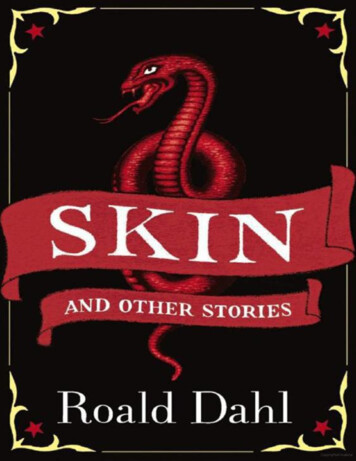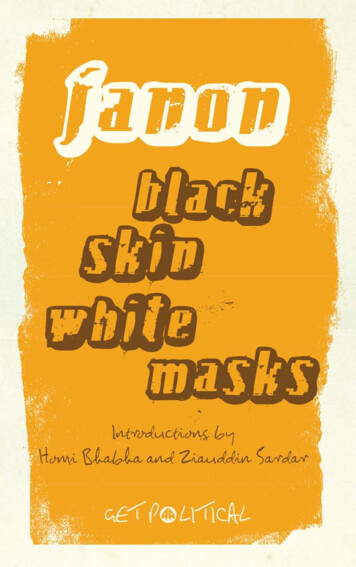
Transcription
Black Skin, White MasksFanon 00 pre i4/7/08 14:16:58
:I E A I mSelected WritingsV.I. LeninEdited byPaul Le Blanc9780745327600Jewish History,Jewish ReligionThe Weightof ThreeThousand YearsIsrael ShahakForewords byPappe / Mezvinsky/Said / VidalBlack Skin,White MasksFrantz FanonForewords byHomi K.Bhabha andZiauddin Sardar9780745328485TheCommunistManifestoKarl Marx andFriedrich EngelsIntroduction byDavid Harvey97807453284619780745328409Theatre ofthe OppressedAugusto Boal9780745328386CatchingHistory onthe WingRace, Culture andGlobalisationA. SivanandanForeword byColin Prescod9780745328348Fanon 00 pre ii4/7/08 14:16:59
blackskinwhiteitmasksFRANTZ FANONTranslated by Charles Lam MarkmannForewords byZiauddin Sardar and Homi K. BhabhaPLUTO PRESSwww.plutobooks.comFanon 00 pre iii4/7/08 14:17:00
Originally published by Editions de Seuil, France, 1952 as Peau Noire,Masques BlancFirst published in the United Kingdom in 1986 by Pluto Press345 Archway Road, London N6 5AAThis new edition published 2008www.plutobooks.comCopyright Editions de Seuil 1952English translation copyright Grove Press Inc 1967The right of Homi K. Bhabha and Ziauddin Sardar to be identified as theauthors of the forewords to this work has been asserted by them inaccordance with the Copyright, Designs and Patents Act 1988.British Library Cataloguing in Publication DataA catalogue record for this book is available from the British LibraryISBNISBN978 0 7453 2849 2978 0 7453 2848 5HardbackPaperbackThis book is printed on paper suitable for recycling and made from fullymanaged and sustained forest sources. Logging, pulping and manufacturingprocesses are expected to conform to the environmental standards of thecountry of origin. The paper may contain up to 70% post consumer waste.10987654321Designed and produced for Pluto Press byChase Publishing Services Ltd, Sidmouth, EX10 9QG, EnglandTypeset by Stanford DTP Services, NorthamptonPrinted and bound in the European Union byCPI Antony Rowe, Chippenham and EastbourneFanon 00 pre iv4/7/08 14:17:00
CONTENTSForeword to the 2008 edition by Ziauddin SardarForeword to the 1986 edition by Homi K. BhabhaTranslator’s NoteIntroduction12345678The Negro and LanguageThe Woman of Color and the White ManThe Man of Color and the White WomanThe So-Called Dependency Complex of ColonizedPeoplesThe Fact of BlacknessThe Negro and PsychopathologyThe Negro and RecognitionBy Way of ConclusionIndexFanon 00 pre vvixxixxxviii18284561821091631741824/7/08 14:17:00
FOREWORD TO THE 2008 EDITIONZiauddin SardarI think it would be good if certain things were said: Fanonand the epidemiology of oppressionThe opening gambit of Black Skin, White Masks ushers ustowards an imminent experience: the explosion will not happentoday.* But a type of explosion is about to unfold in the text infront of us, in the motivations it seeks, in the different world itenvisages and aims to create. We are presented with a series ofstatements, maxims if you like, both obvious and not so obvious:I do not come with timeless truths; fervor is the weapon of choiceof the impotent; the black man wants to be white, the white manslaves to reach a human level. We are left with little doubt we areconfronting a great deal of anger. The resentment takes us to aparticular place: a zone of non-being, an extraordinary sterile andarid region, where black is not a man, and mankind is digginginto its own flesh to find meaning.But this not simply a historic landscape, although Black Skin,White Masks is a historic text, firmly located in time and place.Fanon’s anger has a strong contemporary echo. It is the silentscream of all those who toil in abject poverty simply to exist in thehinterlands and vast conurbations of Africa. It is the resentment ofall those marginalized and firmly located on the fringes in Asia andLatin America. It is the bitterness of those demonstrating againstthe Empire, the superiority complex of the neo-conservativeideology, and the banality of the “War on Terror.” It is the angerof all whose cultures, knowledge systems and ways of being thatare ridiculed, demonized, declared inferior and irrational, and, insome cases, eliminated. This is not just any anger. It is the universal* Direct quotations from Black Skin, White Masks are set in italics.viFanon 00 pre vi4/7/08 14:17:00
F O R EWO R D TO TH E 2 0 0 8 ED ITIO Nviifury against oppression in general, and the perpetual dominationof the Western civilization in particular.This anger is not a spontaneous phenomenon. It is no gutreaction, or some recently discovered passion for justice andequity. Rather, it is an anger borne out of grinding experience,painfully long self analysis, and even longer thought and reflection.As such, it is a guarded anger, directed at a specific, long termdesire. The desire itself is grounded in self-consciousness: when itencounters resistance from the other, self-consciousness undergoesthe experience of desire—the first milestone on the road thatleads to dignity. Black Skin, White Masks offers a very particulardefinition of dignity. Dignity is not located in seeking equalitywith the white man and his civilization: it is not about assumingthe attitudes of the master who has allowed his slaves to eatat his table. It is about being oneself with all the multiplicities,systems and contradictions of one’s own ways of being, doingand knowing. It is about being true to one’s Self. Black Skin,White Masks charts the author’s own journey of discovering hisdignity through an interrogation of his own Self—a journey thatwill not be unfamiliar to all those who have been forced to endurewestern civilization.1. I was born in the AntillesFrantz Omar Fanon, born on 20 July 1925 in Fort-de-France,in the French colony of Martinique, was a complex figure, withmultiple selves. He was, as he tells us, from Antilles but he endedhis life thinking of himself as an Algerian. His parents belongedto the middle class community of the island: father a descendantof slaves, mother of mixed French parenthood. In Fort-de-France,he studied at Lycée Schoelcher, where one of his teachers waspoet and writer Aimé Césaire. Césaire’s passionate denouncementof colonial racism had a major influence on the impressionableFanon. As a young dissident, he agitated against the Vichy regimein the Antilles and traveled to Dominica to support the Frenchresistance in the Caribbean. Soon afterwards, he found himself inFrance where he joined the resistance against the occupying forcesFanon 00 pre vii4/7/08 14:17:00
viiiBL AC K S KI N, WHI TE M A SKSof Nazi Germany. While serving in the military, Fanon experiencedracism on a daily basis. In France, he noticed that French womenavoided black soldiers who were sacrificing their lives to liberatethem. He was wounded; and was awarded the Croix de Guerrefor bravery during his service in the Free French forces.After the War, Fanon won a scholarship to study medicine andpsychiatry in Lyon.While still a student he met José Dublé, a French woman whoshared his convictions against racism and colonialism. The couplemarried in 1952, had one son, and stayed together for the rest oftheir lives. Fanon also began to use psychoanalysis to study theeffects of racism on individuals, particularly its impact on the selfperception of blacks themselves. During the 1950s metropolitanFrance was a center of revolutionary philosophy and a magnetfor writers, thinkers and activists from Africa. Fanon imbibed theideas of philosopher Jean-Paul Sartre; and became friends withOctave Mannoni, French psychoanalyst and author of Psychologyof Colonization. As a young man searching for his own identity ina racist society, Fanon identified with the African freedom fighterswho came to France seeking allies against European colonialism.He began to define a new black identity; and became activelyinvolved in the anti-colonialist struggle. So when, in 1953, hewas offered a job as head of the psychiatric department of BildaJoinville Hospital in Algiers he jumped at the opportunity.Fanon arrived in Algeria just as the colony was on the verge ofa full blown, violent struggle against the French. He was appalledby the racist treatment of Algerians and the disparity he witnessedbetween the living standards of the European colonizers andthe indigenous Arab population. He developed a close rapportwith the Algerian poor and used group therapy to help, as wellas study, his patients. There was intellectual ferment too. Amajor event of 1954 was the publication of Vacation de l’Islamby the Algerian social philosopher Malek Bennabi. Publishedto synchronize with the outbreak of the Algerian revolution,Vacation de l’Islam presented the radical concept of “colonisibilité”: the historical process through which Algeria, and otherMuslim countries, declined culturally and intellectually to a stageFanon 00 pre viii4/7/08 14:17:00
F O R EWO R D TO TH E 2 0 0 8 ED ITIO Nixwhere colonialism becomes a “historical necessity.” Bennabi, wholike Fanon spent most of his life struggling against French racism,distinguished between “a country simply conquered and occupiedand a colonised country.”1 The latter had lost its own culturalbearings and internalized the idea of the inherent superiority of thecolonizing culture. Fanon and Bennabi never met; but it is difficultto imagine their work did not fertilize each other’s thought.The French response to the 1954 Algerian revolt was brutal,involving torture, killing, physical abuse and barbaric repression.For two years Fanon secretly supported the revolutionaries. Then,in 1956, he resigned his post and openly joined the NationalLiberation Front (FLN). He moved to Tunis, where he workedfor Manouba Clinic and Neuropsychiatric Center and foundedthe radical magazine Moudjahid (from Jihad, meaning freedomfighter). Soon he acquired a reputation as a leading ideologue ofthe Algerian revolution. He received many death threats from theFrench and their sympathizers—which only served to strengthenhis resolve. By now, Fanon identified himself as an Algerian.He traveled throughout Africa speaking on behalf of the FLN;and even served as an ambassador to Ghana on behalf of theprovisional government of Algeria.Fanon did not live to see Algeria acquire full independence.While still in Ghana he was diagnosed with leukemia. He wentfirst to the Soviet Union for treatment; and later to the UnitedStates. He died in Washington on 6 December 1961.Throughout the 1960s and 1970s, Fanon was hailed as arevolutionary writer, a hero of the Third World and anti-colonialmovement. He wrote his most influential book, The Wretched ofthe Earth, just before his death. Published in 1961, with a prefaceby Sartre, it became a key text for radical students and served asan inspiration for the Black Power movement in the United States.While its endorsement of violence is problematic, The Wretchedof the Earth offers one of the most penetrating analyses of thesocial psychology of colonialism. But Fanon’s celebrity collapsedalmost as quickly as the Berlin Wall and he was even forgotten inAlgeria which he claimed as his own. Conservative writers havereacted against his views on violence and leftist intellectuals haveFanon 00 pre ix4/7/08 14:17:00
xBL AC K S KIN , WHITE M A SKSdismissed his revolutionary statements as outdated and naïve. Butthe arrival of postcolonial studies in the 1990s heralded a newinterest in Fanon. Today, Fanon waits to be rediscovered by a newgeneration burning with a desire for change—the very emotionthat motivated Fanon to set sail from Martinique.2. The architecture of this book is rooted in the temporalFanon wrote Black Skin, White Masks when he was 27. Publishedin 1952, it was his first and perhaps most enduring book. And itwas ignored. Its significance was recognized only after the deathof the author, particularly after the publication of the Englishtranslation a decade and a half later in 1967. It was a year whenanti-war campaigning was at its height; and student strikes andprotests, that began at Columbia University, New York, started tospread like wildfire across the United States and Europe. MartinLuther King was leading the civil rights movement and was tobe assassinated a year later. Advocates of black power werecriticizing attempts to assimilate and integrate black people. Thebook caught the imagination of all who argued for and promotedthe idea of black consciousness. It became the bible of radicalstudents, in Paris and London, outraged at the exploitation ofthe Third World.Black Skin, White Masks was the first book to investigatethe psychology of colonialism. It examines how colonialismis internalized by the colonized, how an inferiority complex isinculcated, and how, through the mechanism of racism, blackpeople end up emulating their oppressors. It is due to the sensitivitiesof Fanon, says Ashis Nandy, that “we know something about theinterpersonal patterns which constituted the colonial situation,particularly in Africa.”2 Fanon began a process of psychoanalyticdeconstruction that was developed further first by Nandy in TheIntimate Enemy and then by Ngugi wa Thiong in Decolonisingthe Mind (1986). Other theorists of colonial subjectivity havefollowed in their footsteps.Fanon writes from the perspective of a colonized subject. He isa subject with a direct experience of racism who has developed aFanon 00 pre x4/7/08 14:17:00
F O R EWO R D TO TH E 2 0 0 8 ED ITIO Nxinatural and intense hatred of racism. When it comes to experience,this is no ordinary subject: already the author has fought for theresistance in the Caribbean and France, has been wounded nearthe Swiss border, and received a citation for courage. He has aprofessional interest in psychoanalysis and speaks of SigmundFreud, Alfred Adler, and Carl Gustav Jung without muchdistinction. He is going to offer us a psychoanalytic interpretation of the black problem, he says. But we can be sure that this
FOREWORD TO THE 2008 EDITION Ziauddin Sardar I think it would be good if certain things were said: Fanon and the epidemiology of oppression The opening gambit of Black Skin, White Masks ushers us towards an imminent experience: the explosion will not happen today.

